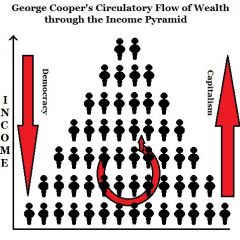A rational re-adoption of protectionism is the key to returning economic strength to every nation and to the world as a whole.
Radical Protectionism
In an ideal world, every country would impose a 20% tariff on all imported goods and services, across the board. This would require no policy decision making on individual industries, and every sector would share in the same level of protection from cheap imports. This would allow every nation to develop new industries, with at least a modicum of protection, to help them get started. This would be the help that developing nations to succeed in the face of hot competition from the developed nations, who are presently living off the “wealth” of their first-mover-advantage. Such an approach would certainly not lead to a trade war.
However, this idea is far too radical for most politicians and economists, and would require a Trump-like revolution to bring it about.
Rational Protectionism
Rational protectionism would be much easier to sell, being targeted at the difficult spots in each economy, leaving the current arrangements in place for all other sectors.
In the USA, Donald Trump’s proposal to put a higher tariff on US companies re-importing goods into the USA is a case in point. His proposal impacts on companies that have moved their plants off US soil to utilize low labor costs elsewhere.
Actually it is a more reasonable way to protect US intellectual property, rather than trying to bully other nations via a TPP. Ideas that are developed in the USA, using all the resources and experience of the USA, in a way actually “belong to the USA”. Thus there is a rationality to imposing the kind of tariff that Donald Trump has proposed. It could be extended to cover any products made in foreign countries, and imported into the USA, which substantially incorporate expertise developed in the USA, whether patented or not.
The concept would also make sense in Australia, which has developed many great ideas, but for which the market here is too small to properly exploit. The Cochlear implants are an obvious case in point.
Another rational use of tariffs in Australia would include horticultural products. Here we have a natural advantage in our developed agricultural methods, but this is offset by an actual disadvantage in labor in Australia being much more expensive per hour than elsewhere. Since Australia has a emotional and rational attachment to producing its own food, it would be a good first case for the doctrine of “rational protectionism” to be adopted.
A similar case applies to the foreign outsourcing of labor services. The current outsourcing framework is far from rational. In Australia, we have payroll tax (also crazy) and a superannuation levy (rational), but suppliers of outsourced labor in India do not have to face such cost hurdles. Also India’s labor cost per hour is a simple fraction of Australia’s cost per hour. Unless something is done, more and more jobs will be outsourced to foreign countries, leaving even high skilled Australians with no jobs that they can fill.
Conclusion
Protectionism is not a “danger” to the world, but if adopted rationally it will restore economic health to every nation, and actually help to build up developing nations.

I don’t commonly comment but I gotta admit thank you
for the post on this special one :D.